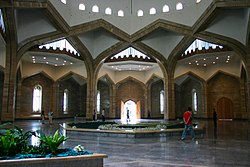| Revision as of 14:42, 17 December 2024 editSundostund (talk | contribs)Autopatrolled, Extended confirmed users, File movers, Rollbackers, Template editors149,974 editsNo edit summary← Previous edit | Revision as of 14:46, 17 December 2024 edit undoSundostund (talk | contribs)Autopatrolled, Extended confirmed users, File movers, Rollbackers, Template editors149,974 editsNo edit summaryNext edit → | ||
| Line 33: | Line 33: | ||
| }} | }} | ||
| '''Assad Mausoleum''', commonly known as '''Hafez al-Assad Mausoleum''' ({{langx|ar|ضريح حافظ الأسد}}), officially known as "'''Immortal Leader's Mausoleum'''" during the ],<ref>{{Cite news|url=https://www.discover-syria.com/print/6978|title=الذكرى العاشرة لرحيل القائد الخالد حافظ الأسد|publisher=اكتشف سورية|date=2010-06-10}}</ref> was the mausoleum of the ], which ruled ] from 1970 until 2024. It was mainly centered on the mausoleum of former ] ] and his eldest son ]. The mausoleum was located in ] in ], in the northwest of the country. The village is the hometown of the Al-Assad family. On 8 December 2024, the ] led to the ]. Three days later, the mausoleum was destroyed.<ref>{{Cite web |title=Syria rebels burn tomb of Bashar al-Assad's father Hafez |url=https://www.bbc.com/news/articles/c1wq01wde44o |access-date=2024-12-11 |website=www.bbc.com }}</ref> | '''Assad Mausoleum''', commonly known as '''Hafez al-Assad Mausoleum''' ({{langx|ar|ضريح حافظ الأسد}}), officially known as "'''Immortal Leader's Mausoleum'''" ({{langx|ar|ضريح الزعيم الخالد}}) during the ],<ref>{{Cite news|url=https://www.discover-syria.com/print/6978|title=الذكرى العاشرة لرحيل القائد الخالد حافظ الأسد|publisher=اكتشف سورية|date=2010-06-10}}</ref> was the mausoleum of the ], which ruled ] from 1970 until 2024. It was mainly centered on the mausoleum of former ] ] and his eldest son ]. The mausoleum was located in ] in ], in the northwest of the country. The village is the hometown of the Al-Assad family. On 8 December 2024, the ] led to the ]. Three days later, the mausoleum was destroyed.<ref>{{Cite web |title=Syria rebels burn tomb of Bashar al-Assad's father Hafez |url=https://www.bbc.com/news/articles/c1wq01wde44o |access-date=2024-12-11 |website=www.bbc.com }}</ref> | ||
| == History == | == History == | ||
Revision as of 14:46, 17 December 2024
| Mausoleum of the Immortal Leader | |
|---|---|
| ضريح القائد الخالد | |
 Mausoleum in 2005 Mausoleum in 2005 | |
| Details | |
| Established | 1994 |
| Abandoned | 11 December 2024 |
| Location | Qardaha, Latakia Governorate |
| Country | |
| Coordinates | 35°27′35″N 36°04′03″E / 35.459765°N 36.067501°E / 35.459765; 36.067501 |
| Type | Tomb |
| Owned by | Al-Assad family Ba'athist regime |
| Find a Grave | Mausoleum of the Immortal Leader |
Assad Mausoleum, commonly known as Hafez al-Assad Mausoleum (Arabic: ضريح حافظ الأسد), officially known as "Immortal Leader's Mausoleum" (Arabic: ضريح الزعيم الخالد) during the Ba'athist regime, was the mausoleum of the Al-Assad family, which ruled Syria from 1970 until 2024. It was mainly centered on the mausoleum of former President of Syria Hafez al-Assad and his eldest son Bassel al-Assad. The mausoleum was located in Qardaha in Latakia Governorate, in the northwest of the country. The village is the hometown of the Al-Assad family. On 8 December 2024, the fall of Damascus led to the fall of the Assad regime. Three days later, the mausoleum was destroyed.
History
See also: Death and state funeral of Hafez al-Assad
In 1989, the Syrian government commissioned architect Abdul Rahman Naassan to design the Naissa Mosque in Qardaha, which was named after Naissa Shalish al-Assad, the mother of then-President Hafez al-Assad. From then on, Qardaha became the hub for the Assad regime's promotion of the "cult of personality".
In 1994, Bassel al-Assad, the president's eldest son and designated successor, died in a car accident. The Syrian government buried him near the mosque and built a mausoleum. On 10 June 2000, Hafez al-Assad died suddenly of a heart attack. After a state funeral in Damascus, his body was airlifted to the Naissa Mosque and buried in the center of the mausoleum. Since then, the mausoleum of Assad and his son had been guarded and maintained by the Syrian security forces and was open to tourists. Bashar al-Assad, the second son of Hafez and the younger brother of Bassel, became the President of Syria after his father's death.
After the fall of the Assad regime in December 2024, the tombs in the mausoleum were dug up and burned by Syrian rebels.
Architecture
The mausoleum was a mixture of classical Syrian and modernist architecture. The overall structure was octagonal in shape. The interior design was clean and restrained. The interior space was large and spacious, with multiple arched high-rise structures. The exterior was decorated with excerpts from the Quran in stone in Arabic calligraphy.
References
- "الذكرى العاشرة لرحيل القائد الخالد حافظ الأسد". اكتشف سورية. 2010-06-10.
- "Syria rebels burn tomb of Bashar al-Assad's father Hafez". www.bbc.com. Retrieved 2024-12-11.
- Miller, Majorie and Daniszewski, John. Mourners Say Goodbye to Syria’s ‘Lion’ Los Angeles Times. 14 June 2000.
- Naissa Mosque Archnet Digital Library.
- ^ Daniel Demeter (2013-09-12). "al-Qardaha القرداحة". Syria Photo Guide.
- "Bashar was elected as the President of Syria. Jiang Zemin sent a congratulatory message". People's Daily (in Chinese). 2000-07-12. Archived from the original on 2022-06-17. Retrieved 2022-06-16.
- "Bashar takes office as Syrian president". People's Daily (in Chinese). 2000-07-18. Archived from the original on 2022-06-21. Retrieved 2022-06-21.
- Liu Ziqin (December 2024). "[Video] The new Syrian government will disband the army and close the prisons. Assad's tomb was dug up and the body was burned". Report.
- AFP (2024-12-11). "Tomb of Assad's father set on fire in Syria". Daily Sun.
See also
- Mausoleum of Ruhollah Khomeini
- Gamal Abdel Nasser Mosque
- Türkmenbaşy Ruhy Mosque (mausoleum of Saparmurat Niyazov)
- Hazrat Khizr Mosque (mausoleum of Islam Karimov)
- Astana Giribangun (mausoleum of Suharto)
- Mazar-e-Quaid (mausoleum of Muhammad Ali Jinnah